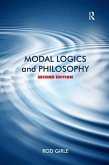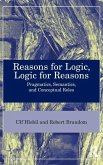- Broschiertes Buch
- Merkliste
- Auf die Merkliste
- Bewerten Bewerten
- Teilen
- Produkt teilen
- Produkterinnerung
- Produkterinnerung
First published in 1990 The Philosopher's Habitat introduces the subject by investigating a variety of the problems which are currently engaging philosophers, and which can be made intelligible to an absolute beginner.
Andere Kunden interessierten sich auch für
![The Philosopher's Habitat The Philosopher's Habitat]() Laurence GoldsteinThe Philosopher's Habitat101,99 €
Laurence GoldsteinThe Philosopher's Habitat101,99 €![Philosophical Logic Philosophical Logic]() John MacFarlanePhilosophical Logic41,99 €
John MacFarlanePhilosophical Logic41,99 €![Introduction to Logic Introduction to Logic]() Irving M. CopiIntroduction to Logic248,99 €
Irving M. CopiIntroduction to Logic248,99 €![Modal Logics and Philosophy Modal Logics and Philosophy]() Rod GirleModal Logics and Philosophy195,99 €
Rod GirleModal Logics and Philosophy195,99 €![Critical Views of Logic Critical Views of Logic]() Critical Views of Logic154,99 €
Critical Views of Logic154,99 €![Reasons for Logic, Logic for Reasons Reasons for Logic, Logic for Reasons]() Ulf HlobilReasons for Logic, Logic for Reasons98,99 €
Ulf HlobilReasons for Logic, Logic for Reasons98,99 €![The Twentieth Century Performance Reader The Twentieth Century Performance Reader]() The Twentieth Century Performance Reader76,99 €
The Twentieth Century Performance Reader76,99 €-
-
-
First published in 1990 The Philosopher's Habitat introduces the subject by investigating a variety of the problems which are currently engaging philosophers, and which can be made intelligible to an absolute beginner.
Produktdetails
- Produktdetails
- Routledge Revivals
- Verlag: Taylor & Francis Ltd
- Seitenzahl: 236
- Erscheinungstermin: 30. Dezember 2024
- Englisch
- Abmessung: 232mm x 158mm x 16mm
- Gewicht: 366g
- ISBN-13: 9781032388663
- ISBN-10: 1032388668
- Artikelnr.: 72488898
- Herstellerkennzeichnung
- Libri GmbH
- Europaallee 1
- 36244 Bad Hersfeld
- gpsr@libri.de
- Routledge Revivals
- Verlag: Taylor & Francis Ltd
- Seitenzahl: 236
- Erscheinungstermin: 30. Dezember 2024
- Englisch
- Abmessung: 232mm x 158mm x 16mm
- Gewicht: 366g
- ISBN-13: 9781032388663
- ISBN-10: 1032388668
- Artikelnr.: 72488898
- Herstellerkennzeichnung
- Libri GmbH
- Europaallee 1
- 36244 Bad Hersfeld
- gpsr@libri.de
Preface Acknowledgements Introduction Part I: Theory of Mind and the
Philosophy of Psychology 1. What is pain? 2. The mystery of dreaming 3.
What are thoughts made of? 4. Prospects for artificial intelligence Part
II: Philosophy of Language and Logic 5. Humor as a guide to the study of
language 6. Speaking your mother tongue: nature or nurture? 7. This
statement is false 8. The Sorites paradox: vagueness and slippery slopes
9. Logic and reasoning Part III: Epistemology 10. The Surprise Examination
11. How are knowledge and belief related? 12. Why are we taught what we are
taught? Part IV: Ethical and Social Issues 13. The right to life 14.
Patriotism and racism 15. Love and fidelity 16. How (if at all) should we
be governed? Part V: Science and Metaphysics 17. The myth of simplicity
18. Free action in a material world 19. The world as we perceive it and as
it really is 20. Is it rational to fear being dead? 21. Arguments for and
against God's existence Index
Philosophy of Psychology 1. What is pain? 2. The mystery of dreaming 3.
What are thoughts made of? 4. Prospects for artificial intelligence Part
II: Philosophy of Language and Logic 5. Humor as a guide to the study of
language 6. Speaking your mother tongue: nature or nurture? 7. This
statement is false 8. The Sorites paradox: vagueness and slippery slopes
9. Logic and reasoning Part III: Epistemology 10. The Surprise Examination
11. How are knowledge and belief related? 12. Why are we taught what we are
taught? Part IV: Ethical and Social Issues 13. The right to life 14.
Patriotism and racism 15. Love and fidelity 16. How (if at all) should we
be governed? Part V: Science and Metaphysics 17. The myth of simplicity
18. Free action in a material world 19. The world as we perceive it and as
it really is 20. Is it rational to fear being dead? 21. Arguments for and
against God's existence Index
Preface Acknowledgements Introduction Part I: Theory of Mind and the Philosophy of Psychology 1. What is pain? 2. The mystery of dreaming 3. What are thoughts made of? 4. Prospects for artificial intelligence Part II: Philosophy of Language and Logic 5. Humor as a guide to the study of language 6. Speaking your mother tongue: nature or nurture? 7. This statement is false 8. The Sorites paradox: vagueness and slippery slopes 9. Logic and reasoning Part III: Epistemology 10. The Surprise Examination 11. How are knowledge and belief related? 12. Why are we taught what we are taught? Part IV: Ethical and Social Issues 13. The right to life 14. Patriotism and racism 15. Love and fidelity 16. How (if at all) should we be governed? Part V: Science and Metaphysics 17. The myth of simplicity 18. Free action in a material world 19. The world as we perceive it and as it really is 20. Is it rational to fear being dead? 21. Arguments for and against God's existence Index
Preface Acknowledgements Introduction Part I: Theory of Mind and the
Philosophy of Psychology 1. What is pain? 2. The mystery of dreaming 3.
What are thoughts made of? 4. Prospects for artificial intelligence Part
II: Philosophy of Language and Logic 5. Humor as a guide to the study of
language 6. Speaking your mother tongue: nature or nurture? 7. This
statement is false 8. The Sorites paradox: vagueness and slippery slopes
9. Logic and reasoning Part III: Epistemology 10. The Surprise Examination
11. How are knowledge and belief related? 12. Why are we taught what we are
taught? Part IV: Ethical and Social Issues 13. The right to life 14.
Patriotism and racism 15. Love and fidelity 16. How (if at all) should we
be governed? Part V: Science and Metaphysics 17. The myth of simplicity
18. Free action in a material world 19. The world as we perceive it and as
it really is 20. Is it rational to fear being dead? 21. Arguments for and
against God's existence Index
Philosophy of Psychology 1. What is pain? 2. The mystery of dreaming 3.
What are thoughts made of? 4. Prospects for artificial intelligence Part
II: Philosophy of Language and Logic 5. Humor as a guide to the study of
language 6. Speaking your mother tongue: nature or nurture? 7. This
statement is false 8. The Sorites paradox: vagueness and slippery slopes
9. Logic and reasoning Part III: Epistemology 10. The Surprise Examination
11. How are knowledge and belief related? 12. Why are we taught what we are
taught? Part IV: Ethical and Social Issues 13. The right to life 14.
Patriotism and racism 15. Love and fidelity 16. How (if at all) should we
be governed? Part V: Science and Metaphysics 17. The myth of simplicity
18. Free action in a material world 19. The world as we perceive it and as
it really is 20. Is it rational to fear being dead? 21. Arguments for and
against God's existence Index
Preface Acknowledgements Introduction Part I: Theory of Mind and the Philosophy of Psychology 1. What is pain? 2. The mystery of dreaming 3. What are thoughts made of? 4. Prospects for artificial intelligence Part II: Philosophy of Language and Logic 5. Humor as a guide to the study of language 6. Speaking your mother tongue: nature or nurture? 7. This statement is false 8. The Sorites paradox: vagueness and slippery slopes 9. Logic and reasoning Part III: Epistemology 10. The Surprise Examination 11. How are knowledge and belief related? 12. Why are we taught what we are taught? Part IV: Ethical and Social Issues 13. The right to life 14. Patriotism and racism 15. Love and fidelity 16. How (if at all) should we be governed? Part V: Science and Metaphysics 17. The myth of simplicity 18. Free action in a material world 19. The world as we perceive it and as it really is 20. Is it rational to fear being dead? 21. Arguments for and against God's existence Index








